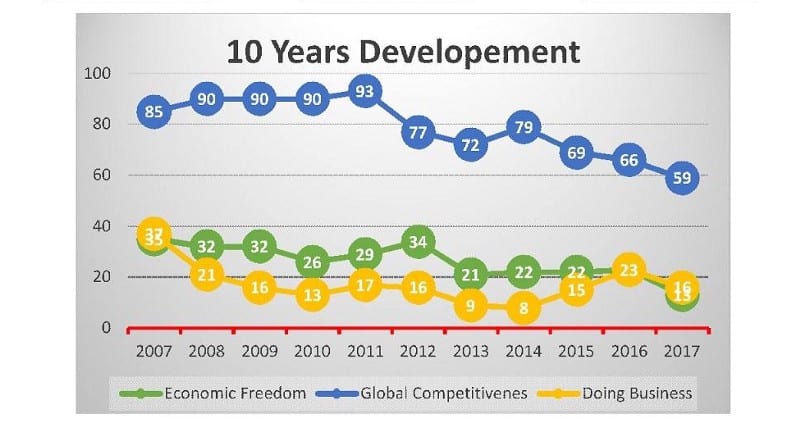In the span of the last five years (2012–2017), Georgia has advanced in numerous prominent international rankings and indexes. These include theFraser Institute, World Bank, International Budget Partnership, World Economic Forum, The Heritage Foundation, Transparency International, Reporters Without Borders, the International Telecommunications Union, and Moody’s Investors Club. The published rankings cover the following areas: economy, governance, freedom of speech, and corruption.
ECONOMY
Georgia is one of the leading countries for implementing business friendly reforms. World Bank’s ‘Ease of Doing Business 2018’ report indicates that Georgia is Europe and Central Asia (ECA) region’s top performer that has improved its positions from 16th place last year to 9th position this year with business friendly environment among 190 countries.
“With tangible reforms implemented in three key areas this year — making electricity more affordable, strengthening minority investor protections, and making resolving insolvency easier — Georgia continues to be a top reformer in the Europe and Central Asia region, and is poised to accelerate inclusive and sustainable growth,” said Mercy Tembon, World Bank Regional Director for the South Caucasus. “We commend the Government of Georgia for this remarkable achievement and encourage them to maintain this momentum.”
Georgia achieved significant progress in the protection of property rights. Georgia moved from 120th place in 2012 to 46th place in the 2015 World Economic Forum and Fraser Institute’s joint rankings.
Market efficiency is another area where Georgia made remarkable progress. In the Extent of Market Dominance ranking by the World Economic Forum, Georgia advanced from 122nd place to 67th. In recognition of government reforms on taxation that encouraged investments, Georgia was named as the top 14 country in the Effect of Taxation on Incentives to Invest rankings and as the top 25 country in the Prevalence of Non-Tariff Barriers rankings. The country also moved from 52nd place to 29th as the import share in GDP decreased.
Georgia was also recognized for fostering a desirable environment for new and existing businesses. In the Business Impact of Rules on FDI, conducted by The World Economic Forum, Georgia moved from 53rd place to 29th place. In the Business Freedom rankings by the Heritage Foundation, Georgia placed 16th in 2017.
Georgia reached the 48th in position 2017 in Macroeconomic Environment rankings, a remarkable leap from 137th in 2012 (World Economic Forum).
Georgia saw the biggest leap in rankings when it came to inflation. The country climbed 114 places from 2012, rebounding from 115th place in inflation rankings to 1st place in 2017 (World Economic Forum).
The President of European Bank for Reconstruction and Development (EBRD) Sir Suma Chakrabarti praised Georgia for its immense economic progress. During his visit to Georgia’s capital, Mr. Chakrabarti recognized the importance of EBRD’s partnerships with Georgia and expressed hope for further collaboration.
“Already the country [Georgia] is one of our largest partners in terms of GDP per capita, and after a record year in 2016 with close to €250 million of new investments we are on course towards an even stronger result this year,” said Mr. Chakrabarti after his meetings with a group of high government officials and investors in Georgia.
Georgia also received praise from The International Monetary Fund, which upped the 2017 economic growth forecast of Georgia to 4.3%. The organization also recognized the Government’s economic program as an impressive one. According to IMF’s assessment, Georgia’s prudent policy, large number of trade partners, exports, tourism, and investments all resulted in faster than expected economic growth.
Another appreciation of Georgia’s economic reforms came from Moody’s Investors Club, which provides credit ratings, research, tools, and analysis that contribute to transparent and integrated financial markets.
“Georgia’s economy has proved resilient to a significant economic, financial and exchange rate shock in the region in 2014–16. Georgia’s GDP growth averaged 3.4% during this period when many of its neighbors were in or close to recession. We attribute this resilience to effective macroeconomic policy management and strong banking supervision that allowed banks to continue to finance the economy,” Moody’s assessment of Georgia’s rating stated.
In the Sovereign Credit Rating, Georgia advanced from Ba3 to Ba2,affirming the stability of Georgian economy.
GOVERNANCE
The United Nations recognized Georgia’s significant progress and named Georgia Chairman of the UN-run Open Governance Partnership Group,which is composed of 74 nations.
In terms of efficient and transparent governance, Georgia was recognized by two more organizations:
In Fraser Institute’s Index of Economic Freedom, Georgia advanced from 14th position in 2012 to 8th in 2015.
In the International Budget Partnership rankings, Georgia placed 16th concerning access to Government-held information for the Public.
CORRUPTION, CYBER SECURITY, MEDIA FREEDOM
The Freedom from Corruption index also demonstrated improvement for Georgia. In an all-time high ranking, Georgia reached 44th place among 176 countries in Transparency International’s Corruption Perceptions Index(CPI) ( this is up seven positions from 51st in 2012).
Regarding media freedom, Georgia advanced by 41 places to 64th, according to Reporters without Borders.
The National Cyber Security Index is one of the highest for Georgia, who maintained 2nd place among the 29 most advanced and developing economies of the world, according to the ITU Global Cyber Security Index rankings.
The World Justice Project (WJP) released its Rule of Law Index 2016.Georgia took 34th out of 113 foreign states in the survey, showing high scores in the order and security component, open governance, and the protection of fundamental rights. Georgia is a regional leader in the Rule of Law Index, with the best score among the other 12 Eastern European and Central Asian countries.

